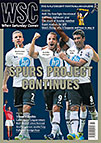 Jon Spurling remembers how the FA began trialling regular games on the Sabbath in the 1970s despite protests from religious groups
Jon Spurling remembers how the FA began trialling regular games on the Sabbath in the 1970s despite protests from religious groups
Football was facing a crisis at the start of 1974. Attendances in all four divisions had been in decline for a while and floodlit matches were banned as part of the “three day week” introduced by Prime Minister Edward Heath to save on electricity consumption. Sunday football was regarded as one way to inject some life back into the flagging domestic game.
BBC commentator David Coleman was already a vocal advocate of Sunday fixtures and, along with fellow commentators Hugh Johns and Kenneth Wolstenholme, had lobbied the FA and Football League to push ahead with a trial in England. “My experiences in countries like Argentina and Brazil have been very positive when it comes to Sunday football,” Coleman explained. “There’s a really carefree atmosphere. Many of the supporters are staunchly religious, but they are still able to worship in the morning, and then go to the match in the afternoon.”
With the UK suffering further power cuts in December 1973 as a result of the miners’ strike, the FA finally agreed to experiment with some FA Cup third round matches played on a Sunday, January 6 at 2pm. Four clubs – Bolton, Bradford City, Cambridge United and Nottingham Forest – opted to stage their ties on that day and, without exception, all teams reported a doubling of their normal gate.
The clubs cunningly sidestepped the Sunday Observance Laws which made charging admission illegal by allowing spectators in for free, but instead charged them the usual admission price for the match programme. The Daily Express, a staunch advocate of Sunday football, ran the headline Sunday Best – Crowds Boom Their Message To the FA. One supporter interviewed at the Bradford City v Alvechurch game was all in favour: “On Sundays, there isn’t a whole lot to do. The shops aren’t open, and if you don’t have a family things can get a bit dull. And I work on Saturdays so can’t get to games. So why not have football on Sunday? It makes perfect sense to me.”
However, there were some powerful opponents to the scheme within the game. Brighton manager Brian Clough, for one: “Whether you’re religious or not is irrelevant, he said to the Daily Mail. “Sundays are for families, and for fathers to spend time with their wives and their bairns.” England manager Alf Ramsey concurred, telling ITV: “Because I’m away for much of the week, Sunday is the one day of the week when my wife should be able to count on me being at home. I’m opposed to the FA’s experiment.” The famously opinionated Bob Lord, Burnley chairman and a Football League Committee member, was also scathing about the idea: “The whole scheme is against the way of life of most Englishmen. On Sundays, Englishmen want to be with their families, and do what they want to do.” Although that shouldn’t include going to watch football.
A fortnight after the FA Cup third round ties held on a Sunday, there were three Division Two matches played, at Bolton, Notts County and Millwall, who drew 15,000 for a 1-0 win over Fulham, more than double their regular gate. On the way in, Millwall supporters were handed fliers by irate church groups. One such spokesman told the BBC: “The whole concept is morally wrong, as it flies in the face of the Fourth Commandment of God; namely that the Sabbath should be kept holy.” At Bradford’s Valley Parade two weeks earlier, police had arrested four protesters who had handcuffed themselves to a turnstile, while holding a placard which promised “Damnation for all ye who enter here”. At the Den around 20 demonstrators contented themselves with a peaceful sit down protest outside the main stand, as bemused spectators filed by.
On January 28, the Bishop of Norwich wrote a letter to the Times outlining his concerns about Sunday football. Several of his points revolved around the “erosion of Christian values in England” but he also referred to the fact that “other major sports will soon be vying with each other for a financial cut of the commercial Sunday cake”. Yet by March 8, with the evenings slowly drawing out, Heath ended the three day week, crowds fell back to their normal level as the novelty wore off and the Sunday experiment was quietly abandoned.
Apart from international tournaments, which England weren’t part of in the mid-to-late 1970s, Sunday matches were rarely an issue until 1983, when ITV signed a deal for the rights to broadcast live matches on a Sunday and such games became part and parcel of football life. With the advent of Sky’s Super Sunday a decade later, the Sabbath had officially become just another busy day for football.
From WSC 324 February 2014